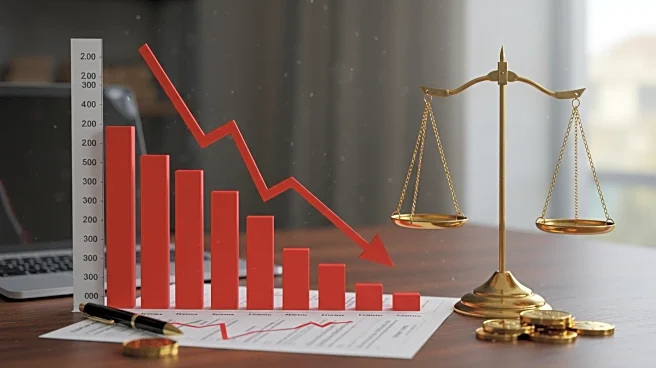What's Happening?
Consumer sentiment in the United States worsened in August following the imposition of new tariffs by President Trump on nearly 70 countries. This decline marks a reversal from two months of improved shopper attitudes, according to data from the University of Michigan Survey. The sentiment measure has returned to a downturn that began after Trump took office, reaching near its lowest level since a period of inflation three years ago. Year-ahead inflation expectations have risen from 4.5% to 4.9%, indicating concerns about future price increases. Despite a recent lower-than-expected inflation reading, consumer spending, which constitutes about two-thirds of U.S. economic activity, remains a critical indicator of economic health.
Why It's Important?
The decline in consumer sentiment is significant as it reflects broader economic concerns amid new tariffs, which could lead to increased prices and affect consumer spending. Consumer spending is a major driver of the U.S. economy, and any downturn could signal potential economic challenges. The firing of BLS Commissioner Erika McEntarfer by President Trump, following a jobs report indicating a labor market cooldown, adds to the uncertainty. McEntarfer's dismissal has been criticized by former BLS Commissioner William Beach, highlighting concerns about the integrity of economic data reporting. The Federal Reserve's decision to hold interest rates steady underscores the potential impact of tariffs on inflation and economic activity.
What's Next?
The economic outlook remains uncertain as stakeholders await further developments regarding tariffs and their impact on inflation and consumer prices. The Federal Reserve may need to adjust its monetary policy if inflation pressures increase. Political and economic leaders will likely continue to debate the implications of tariffs and their effects on the U.S. economy. The resilience of certain economic sectors, such as corporate earnings and consumer spending, will be closely monitored to assess the potential for a broader economic slowdown.
Beyond the Headlines
The firing of Erika McEntarfer raises concerns about the politicization of economic data and its potential impact on public trust in government statistics. The situation highlights the importance of maintaining the independence and integrity of federal agencies responsible for economic measurement. The broader implications of tariffs on international trade relations and domestic economic policy will continue to be a topic of discussion among policymakers and economists.











